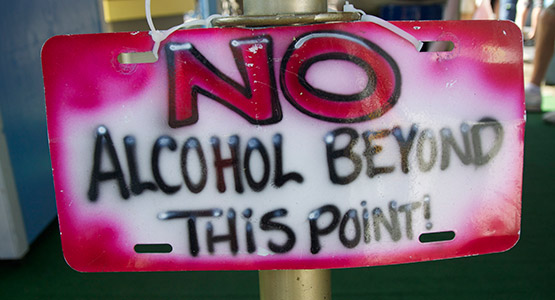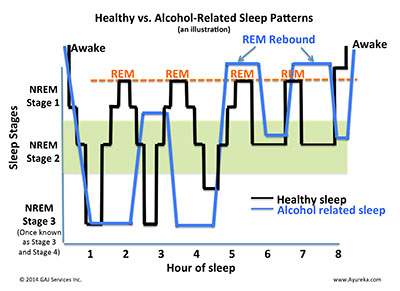Alcohol consumption is a big part of our cultural heritage. America’s founding fathers not only liked to partake, but by modern standards, they liked to over-imbibe. It is estimated that during colonial times, a typical villager drank twice as much alcohol as the average person consumes today. To further emphasize its prevalence, Benjamin Franklin was quoted as fondly saying, “Beer is living proof that God loves us and want to see us happy.” Samuel Adams undoubtedly agreed.
Traditions involving alcohol have stood the test of time. Today, we use alcohol to toast, celebrate, relax and even avoid our lives. For some of us, drinking is an everyday event—a couple of beers after work, a glass of wine with dinner or a bourbon to wind-down in the evening. On weekends, holidays and vacations, daily consumption often increases with the occasion.
Alcohol usage might be All-American, but it is not at all conducive to getting a good’s night sleep. As a matter of fact, alcohol is cited as one of the major contributors to our country’s sleep deprivation health epidemic.
Ironically, many people who suffer from insomnia still utilize alcohol as a sleep aid. These are just some of the ways that it can interfere with sleep:
- Diminishes Deep, Quality Sleep: Although a nightcap may help you relax and quickly move into deep sleep during the first half of the night, it can wreak havoc on the second half. As your body metabolizes the alcohol, its ability to achieve slow-wave sleep is compromised. This restorative NREM Stage 3 sleep is critical for bone and blood health, and for your general immunity. Alcohol causes you to sleep more lightly during this period, so you lose out on these benefits.
- Disrupts Rapid Eye Movement (REM) Sleep: Alcohol has been shown to interfere with REM sleep, which is the mentally and emotionally restorative sleep that “defrags” your brain. Alcohol limits the body’s ability to reach the REM sleep stage in the first-half of the night. A type of “rebound effect” takes place as the body adjusts after metabolizing and eliminating alcohol in the second-half of the night. During this over-correction, very vivid and disruptive dreams can take place as the body works to restore a normal sleep pattern.
- Increases snoring and sleep apnea events: The American Sleep Apnea Association reports that an estimated 22 million Americans suffer from the dangerous condition sleep apnea. And researchers at the Henry Ford Hospital suggest that even isolated snoring can raise risks for hardening of the arteries. Alcohol relaxes muscles in the throat and causes slow and shallow breathing—conditions that prompt isolated snoring, intensify habitual snoring and can increase obstructive sleep apnea events.
- Prompts Early Morning Awakening (EMA): Alcohol is often linked to EMA. Since the alcohol clearing process limits your ability to go into deep sleep, you are more easily awakened. This clearing also causes withdrawal symptoms such as nightmares, night sweats and hot flashes.
- Impairs mental and physical functioning: It actually takes 2 to 3 days for your body to fully recover from a night of drinking and poor sleep. During this period, it has been shown to limit your ability to think, remember or concentrate, and to deplete your overall level of physical energy.
- Effects can snowball: Chronic sleep deprivation actually diminishes your tolerance for alcohol. In other words, the ritual of having a nightcap has an increasingly greater impact on your inability to sleep. While the quantity of alcohol might remain a constant, its negative impact is compounded over time. And, don’t forget, alcohol is a depressant. Imbalances such as depression, anxiety or stress often fuel a drinking habit, and alcohol is likely to intensify these feelings.
The following graphic illustrates how some of the disturbances mentioned above impact normal sleep stages and cycles.
By now you might be wondering how can a little drink have such a big impact on your sleep? A quick look at what your body does with alcohol will help you understand why it can be so disruptive.
Your body’s sole focus is on breaking alcohol down and eliminating it. This happens because alcohol, itself, is of no value to the body. It doesn’t contain any usable minerals, vitamins, carbohydrates, proteins or nutrients. Once alcohol is ingested, approximately 20% of it is absorbed directly into your bloodstream from your stomach. The remainder enters your blood system though the small intestines. Alcohol travels around your circulatory system until it reaches the liver.
The liver is where, for the most part, it is metabolized (i.e. broken down by enzymes for elimination). If healthy, the liver is able to breakdown about one drink per hour. The primary decay product of alcohol metabolism, acetaldehyde, is poisonous, so the body closely controls its production. If you drink more than you are able to metabolize, the alcohol simply continues to circulate and saturate your tissues.
The alcohol elimination process also has an indirect impact on your sleep. As it circulates throughout the body, alcohol is known to cause inflammation of the stomach, pancreas and intestines. With overuse, this inflammation can impair food digestion and cause malabsorption. Plus, acetaldehyde has been shown to interfere with the absorption of various vitamins and nutrients, such as thiamin, B12, folic acid and zinc. Malnutrition, as a whole, and B12 depletion, specifically, have links to disrupted beauty rest.
Our forefathers certainly provided us with many healthy traditions. What is more All-American than an ice cold beer on the 4th of July? But when it comes to getting healthy sleep, your daily drink might be one tradition to consider breaking.
For more information on sleep, check out our “How Things Work: Sleep” section.



